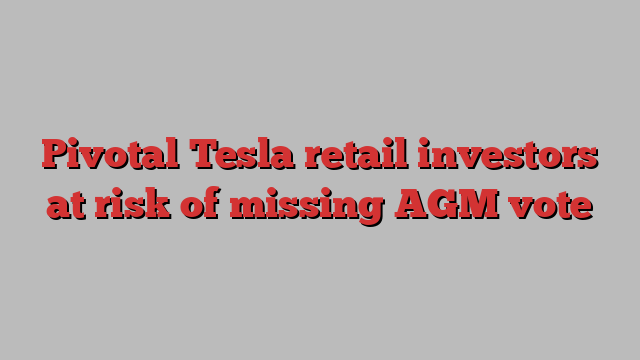
Unlock the Editor’s Digest for free
Roula Khalaf, Editor of the FT, selects her favourite stories in this weekly newsletter.
Tens of thousands of Tesla’s international retail shareholders with around $17bn of stock may be unable to vote at its annual meeting because investment platforms have failed to put adequate cross-border systems in place.
The world’s largest electric vehicle maker has been campaigning to get investors to back two resolutions in what are likely to be tight votes at its June 13 meeting: one to re-ratify chief executive Elon Musk’s $56bn pay and another to reincorporate the company in Texas.
The latter move came after a Delaware judge’s decision to void Musk’s package of share options, the most lucrative in US corporate history, because of concerns over the board’s independence.
Tesla has an unusually high proportion of retail shareholders — who own about 30 per cent of the company — and the high hurdles for success for both votes, in particular the move to Texas, will require many of them to vote in favour. Chair Robyn Denholm has likened her task in winning the shareholder vote to climbing Mount Everest.
But many investors in Europe and Asia have found they are unable to cast their votes electronically from outside the US because the stockbrokers and online trading platforms where they hold their share accounts do not have adequate systems.
Tesla estimates that about 3 per cent of its shares could be affected, according to people familiar with the situation. That is equivalent to $16.7bn of Tesla’s $558bn valuation.
The vote to reincorporate Tesla in Texas has a higher threshold, requiring a majority of all shares outstanding to vote in favour, meaning votes not cast are considered against the proposal.
“Given the size of the retail ownership, every individual vote counts,” one of the people said.
Tesla is working with proxy solicitation firm Innisfree, which has more than 100 staff on the campaign. Their tactics include calling individual investors, sending brochures — nicknamed “fight letters” — encouraging people to vote, and a social media awareness campaign on Musk-owned platform X.
Tesla and Innisfree have been trying to persuade brokers to put new processes in place but, while a few have been helpful, most have not, saying they did not have time to install the infrastructure, the people said.
Hargreaves Lansdown, the UK’s largest private investment platform with $120bn of assets and 1.7mn customers, is one of the international stockbrokers through which Tesla shareholders have been unable to vote.
“Last year we introduced AGM voting for UK and European companies and expanding that service to other overseas jurisdictions is something we are working on,” the company said. In the case of the Tesla, “we have been working with our proxy service provider to try and facilitate this event as a one off. However, it has not been possible.”
HL owns most of its clients’ US securities, including Tesla shares, as a Crest depositary interest, or CDI, which historically did not allow voting in the EU or US. This year Crest partnered with US fintech Broadridge to offer such a service, but it has not yet been extended to all US securities. Despite fierce lobbying from Tesla, it has not been able to install it in time for the carmaker’s votes.
BNP Paribas’s Consorsbank, whose customers also account for a significant number of shares, is another big player that does not offer proxy voting services for US stocks, according to people familiar with the situation. Consorsbank was not available for comment.
Other obstacles may make retail investors less inclined to vote. For example, Amsterdam-based online stock broker Degiro charges a €10 fee for each shareholder who wants to vote, to cover its manual administration expenses; and Switzerland’s Swissquote requires customers to call its service line.
Others have made exceptions in response to the Tesla-backed PR campaign. Swedish online bank Avanza, which doesn’t usually offer voting services in non-domestic markets, emailed customers to inform them that it would allow it as a one-off.
The stakes are high, and even more is riding on the votes of retail shareholders after both of the two big proxy advisers, Glass Lewis and ISS, urged Tesla owners to vote against Musk’s pay resolution. Their opinion influences the decisions of large institutional investors. Tesla did however receive “cautious” backing from ISS for its reincorporation in Texas.
Vanguard, Capital Group, Norway’s oil fund and State Street are among the top-10 Tesla shareholders who voted against the pay proposal in 2018, which nevertheless passed with 73 per cent approval. Baillie Gifford’s flagship Scottish Mortgage Investment Trust, one of the carmaker’s longest-standing shareholders with a top-15 stake, has said it plans to back Musk’s $56bn pay award.
However, the chief executive of Calpers — the largest US public pension fund and a top-25 shareholder with a $1.67bn stake — said in a CNBC interview on Wednesday that it planned to vote against the deal, noting it did “not believe the compensation is commensurate with the performance of the company”.
Musk wrote on X in response.: “Calpers broke the deal. Shame on them, they have no honor.”
Tesla declined to comment.
Additional reporting from Sarah White in Paris